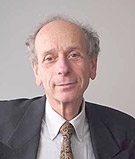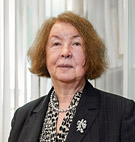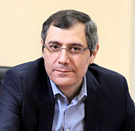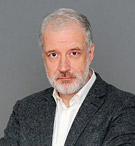
Electronic english version since 2022 |
The newspaper was founded in November 1957
| |
Events
New OGANESSON Award Winners
On 15 September 2025, the winners of the OGANESSON Prize were announced at the 138th session of the Scientific Council of the Joint Institute for Nuclear Research. The prize was created at the suggestion and expense of Academician of the Russian Academy of Sciences (RAS) Yuri Oganessian and established at the Joint Institute for Nuclear Research in 2023.
 The winners of the OGANESSON Prize in 2025 are:
The winners of the OGANESSON Prize in 2025 are:
Michel Spiro, Paris-Saclay University (France), President of The Earth-Humanity Coalition, Past President of the International Union of Pure and Applied Physics (IUPAP), member of the JINR Scientific Council.
He is awarded the prize for outstanding research in high energy and nuclear physics, along with passionate leadership in global initiatives supporting fundamental science.
 Natalia Tarasova, RAS Corresponding Member at the Department of Chemistry and Materials Science, Professor, Doctor of Chemistry, Director of the Institute of Chemistry and Sustainable Development Problems at the Mendeleev University of Chemical Technology of Russia.
Natalia Tarasova, RAS Corresponding Member at the Department of Chemistry and Materials Science, Professor, Doctor of Chemistry, Director of the Institute of Chemistry and Sustainable Development Problems at the Mendeleev University of Chemical Technology of Russia.
She receives the award for outstanding contribution to cooperation with international organizations and scientific unions (UNESCO, IUPAC, ISC), aimed at achieving the Sustainable Development Goals.
 Arutyun Avetisyan, RAS Academician, mathematician, system programming specialist, Director of the RAS Institute for System Programming, Head of the Department of System Programming at the Faculty of Computational Mathematics and Cybernetics at Moscow State University, Department of Management and Applied Mathematics at the Moscow Institute of Physics and Technology, and the Faculty of Computer Science at Higher School of Economics.
Arutyun Avetisyan, RAS Academician, mathematician, system programming specialist, Director of the RAS Institute for System Programming, Head of the Department of System Programming at the Faculty of Computational Mathematics and Cybernetics at Moscow State University, Department of Management and Applied Mathematics at the Moscow Institute of Physics and Technology, and the Faculty of Computer Science at Higher School of Economics.
The award recognises his outstanding contribution to the creation of trustworthy artificial intelligence in scientific and applied fields and the training of highly qualified young specialists in modern information technology.
 Alexei Semikhatov, Chief Researcher at the Division of Theoretical Physics at the RAS Lebedev Physical Institute, host of the Question of Science programme on the Nauka TV channel, host of the Universe Plus YouTube channel, lecturer, and author of popular science films.
Alexei Semikhatov, Chief Researcher at the Division of Theoretical Physics at the RAS Lebedev Physical Institute, host of the Question of Science programme on the Nauka TV channel, host of the Universe Plus YouTube channel, lecturer, and author of popular science films.
He is awarded for outstanding contribution to the popularisation of scientific knowledge in Russia, particularly in quantum physics.
* * *
China International Partnership Programme Award
On 1 September, Head of the Sector of Reactor Neutrinos at the Department of Elementary Particle Physics Maxim Gonchar and his Chinese colleague Liang Zhang were presented the International Partnership Programme Award of the Chinese Academy of Sciences.
Maxim Gonchar and Liang Zhang are members of the JUNO collaboration and collaborate on the investigation of oscillations of reactor electron antineutrinos. Specifically, over the past five years, they have been working on statistical analysis for JUNO and estimating the project's sensitivity to neutrino mass ordering. Liang Zhang represented a group at the Institute of High Energy Physics of the Chinese Academy of Sciences and Maxim Gonchar represented a group at the Joint Institute for Nuclear Research. The results of this research were included in the JUNO collaboration's latest paper on the experiment's sensitivity. They represent two of the three groups that worked on the statistical analysis described in the paper.
Maxim Gonchar and Liang Zhang currently work on the first data from the JUNO experiment.
DLNP Scientific Communications Group